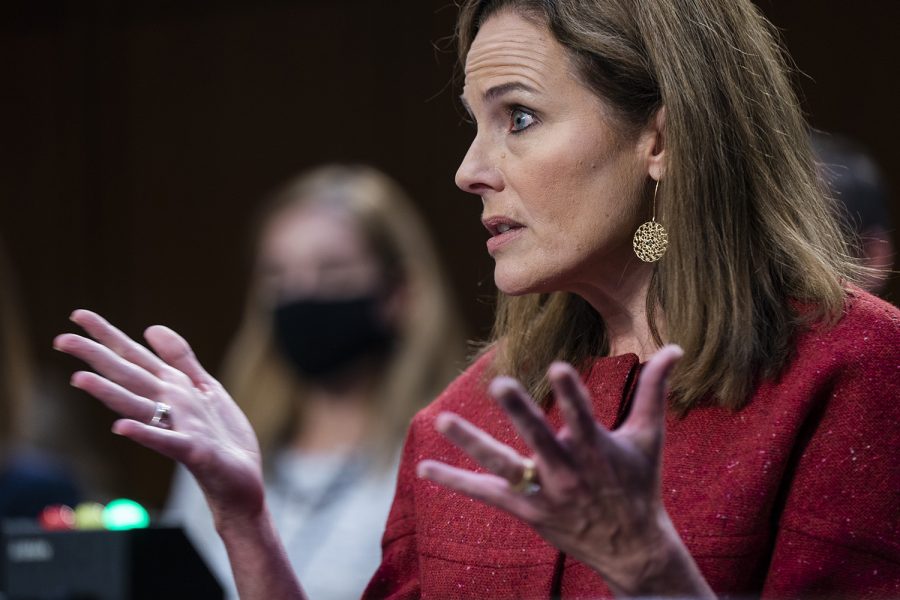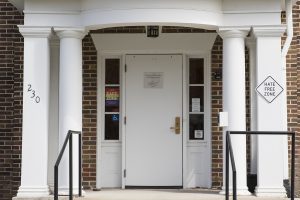Opinion | Trump’s supreme court nominee is a danger to the LGBTQ community
Statements made by Amy Coney Barrett show her ignorance of the LGBTQ community, as well as settled science.
Supreme Court nominee Judge Amy Coney Barrett testifies before the Senate Judiciary Committee on the second day of her Supreme Court confirmation hearing on Capitol Hill on October 13, 2020 in Washington, DC. Barrett was nominated by President Donald Trump to fill the vacancy left by Justice Ruth Bader Ginsburg who passed away in September. (Jim Lo Scalzo/Pool/Getty Images/TNS)
October 13, 2020
The legal battle for LGBTQ rights has just taken a drastic tonal change with the nomination of Amy Coney Barrett. Her placement onto the court could spell disaster for every noncisgendered, non-heterosexual individual in the United States.
Amy Coney Barrett stated in the second day of her hearing that she does not discriminate based on “sexual preference.” But that statement alone causes worry.
The framing of sexual orientation — the legally identified term — as a preference is a long-standing way of ostracizing the gay community. By labelling sexual orientation as a choice, it is seen as a life-style choice rather than an intrinsic part of who you are.
But her statement on not discriminating is also somewhat untrue. While she served on the board of trustees for Trinity Schools Incorporated, she upheld the policy of discriminating against the children of same-sex couples.
She has also said it was an “interpretive strain” of title IX to protect trans people in a 2016 lecture.
Barrett alone would not trouble me so much were it not for the fact that other Justices are already hostile towards the concept of gay marriage, let alone a myriad of other rights still being fought for today.
Earlier this month, Justices Alito and Thomas attacked the Supreme Court’s decision on gay marriage, signaling their desire for it to be overturned.
A 5-4 decision five years ago and three Justice seats now given to conservative appointees does not bode well for LGBTQ rights in the U.S.
What hurts me most is that Iowa senators are not just complicit, but enthusiastically defending Barrett’s hearing. Both Joni Ernst and Chuck Grassley are supporting this rammed-through hearing despite their objections to such a situation in the past.
Grassley said back in July that court seats should be left open in election years — Ernst agreed.
At least, they agreed when it was a Democrat filling the seat.
I’ve written in the past about how the U.S. still has plenty of progress to be made as far as equality goes. But the threat here isn’t just stopping progress from being made — it’s threatening to walk back on all the ground that’s already been hard-fought for.
Another concern is how long these Justices will remain in the court as well. Kavanaugh is 55, Gorsuch is 53, and Barrett is 48. If they get the opportunity to overthrow Obergfell v. Hodges, it may be decades before we get the chance to win the right to same-sex marriage again.
Alexandria Ocasio-Cortez spoke on this topic best when she called into a charity stream nearly two years ago. If this were put into legislation, it would make it seem as though these constitutional protections are up for debate — that they weren’t guaranteed under the law already.
Though it may be that we will have to put forward legislation in the House and Senate in the future to protect same-sex marriage and other rights, it would be a travesty of the highest order. We as a country value equality, and to make an addendum saying “the law doesn’t actually mean equality, here’s equality now” is outrageous.
If Barrett gets confirmed, we will need all the possible support in the future to protect the rights of our fellow Americans. Please, this November, vote for people who will stand for equality and not against it.
Columns reflect the opinions of the authors and are not necessarily those of the Editorial Board, The Daily Iowan, or other organizations in which the author may be involved.




